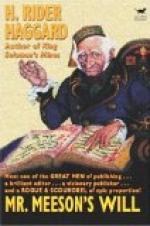Now, Eustace had often, when in the Shorts’ sitting-room in the lodging-house in the Strand heard the barrister James hold forth learnedly on the matter of wills, and, therefore, he naturally enough turned towards him in his recent dilemma. Knowing the address of his chambers in Pump-court, he hurried thither, and was in due course admitted by a very small child, who apparently filled the responsible office of clerk to Mr. James Short and several other learned gentlemen, whose names appeared upon the door.
The infant regarded Eustace, when he opened the door, with a look of such preternatural sharpness, that it almost frightened him. The beginning of that eagle glance was full of inquiring hope, and the end of resigned despair. The child had thought that Eustace might be a client come to tread the paths which no client ever had trod. Hence the hope and the despair in his eyes. Eustace had nothing of the solicitor’s clerk about him. Clearly he was not a client.
Mr. Short was in “that door to the right.” Eustace knocked, and entered into a bare little chamber about the size of a large housemaid’s closet, furnished with a table, three chairs (one a basket easy), and a book-case, with a couple of dozen of law books, and some old volumes of reports, and a broad window-sill, in the exact centre of which lay the solitary and venerated brief.
Mr. James Short was a short, stout young man, with black eyes, a hooked nose, and a prematurely bald head. Indeed, this baldness of the head was the only distinguishing mark between James and John, and, therefore, a thing to be thankful for, though, of course, useless to the perplexed acquaintance who met them in the street when their hats were on. At the moment of Eustace’s entry Mr. Short had been engaged in studying that intensely legal print, the Sporting Times, which, however, from some unexplained bashfulness, he had hastily thrown under the table, filling its space with a law book snatched at hazard from the shelf.
“All right, old fellow,” said Eustace, whose quick eyes had caught the quick flutter of the vanishing paper; “don’t be alarmed, it’s only me.”
“Ah!” said Mr. James Short, when he had shaken hands with him, “you see I thought that it might have been a client—a client is always possible, however improbable, and one has to be ready to meet the possibility.”
“Quite so, old fellow,” said Eustace; “but do you know, as it happens, I am a client—and a big one, too; it is a matter of two millions of money—my uncle’s fortune. There was another will, and I want to take your advice.”
Mr. Short fairly bounded out of the chair in exultation, and then, struck by another thought, sank back into it again.
“My dear Meeson,” he said, “I am sorry I cannot hear you.”
“Eh,” said Eustace; “what do you mean?”
“I mean that you are not accompanied by a solicitor, and it is not the etiquette of the profession to which I belong to see a client unaccompanied by a solicitor.”




